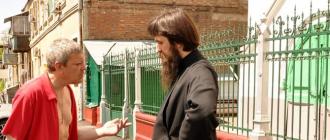Among all the lessons at school, I like history the most. And now I will explain why.
Firstly, I love learning about everything unusual, everything that is different from the usual everyday life. And history is always unusual. Previously, people lived completely differently than we do now. They thought differently, believed in different ideas. They lived in a different fashion, different ideals.
Even the things in their home were completely different. They did not know about many modern inventions then. They could not even imagine many technical innovations, for example, a smartphone, a robot vacuum cleaner or a plasma TV on an entire wall!
Secondly, history tells a lot about people. About their mistakes and victories. About failures and achievements. History teaches the causes and consequences of events. Teaches you to see the mistakes and miscalculations of great people, develops logical thinking. For example, Napoleon did not calculate that his army in Russia would fall into severe frosts. He did not take care of either warm winter clothes or warm shoes for the soldiers. He did not provide his army with food. As a result, in 1812 he was driven out of Moscow by Kutuzov’s army and driven all the way to Paris.
Thirdly, we have a wonderful history teacher. This is Anna Artemovna. She loves her subject, loves us, the students. During lessons, she pauses and distracts us so that we don’t get tired. You can joke and laugh with her in class, and then start learning again. Anna Artemovna also teaches us to develop logic and intelligence.
I like to study. New knowledge opens up new impressions, new opportunities, new territories. The human brain requires constant development.
I really like studying history. This is one of my favorite school subjects. Plunging into the historical past, you can imagine yourself in the place of some famous sage or ruler. The subject of history makes it possible to develop imagination, spatial thinking, and memory. Teaches you to analyze and draw conclusions.
It is especially interesting to get acquainted with the history of your country. Much important and necessary experience of previous generations can be used in modern life. To do this, it is necessary to carefully and in detail consider historical facts. The story is attractive to me Ancient Rome, Egypt. This ancient cultures of which little remains now. Entire cities are buried under layers of sand, or covered with thick water. But people lived in them. People had a way of life, there were joys, tears, wars.
The history of Russia is no less fascinating. Both the newest and ancient Rus'. Our ancestors lived in harmony with nature. And under the kings there were both hungry and well-fed times.
The Great Patriotic War 1941-1945 The feat accomplished by the Russian people at this time cannot be underestimated. The price for victory was high, but our grandfathers would have paid more if necessary.
History is not easy school subject. This is our past, present, future of future generations. History provides an opportunity to take advantage of the experience that our ancestors have accumulated. History is life. I wish there were more ways to visually explore historical moments. Our life is closely connected with history. And knowing what happened before you is incredibly interesting. After all, we too will become history. And someone will study our time as a school subject.
Essay reasoning Favorite school subject history for 5th grade
Several interesting essays
- The role of art in human life 9th, 11th grade Unified State Examination OGE essay
Art has existed in human life since ancient times. Our ancestors painted silhouettes of animals on the walls of caves with charcoal and plant juices. Thanks to surviving fragments of their work, we now present
- Essay on the proverb Be not quick to promise, but quick to fulfill
How much wisdom lies in our proverbs and sayings. After all, they teach us life so quietly and save us from unique mistakes.
- Essay based on the painting by Khrutsky Flowers and fruits grades 5 and 3 (description)
In the painting by I.T. Khrutsky “Flowers and Fruits” we see perfect combination colors and shapes. The picture charges us summer mood, and the picture depicts the gifts of nature from late spring to early autumn.
- The image and characteristics of Prince Vsevolod in the Tale of Igor's Campaign essay
Vsevolod is one of the main characters, he was younger brother the main character is Igor. His wife is Olga, the granddaughter of Yuri Dolgoruky.
- Mayakovsky's love lyrics (Love in creativity) essay grade 11
Almost every Russian poet in his works first of all tried to convey his feelings, emotions, love. That is why often every poem of poets is their story. One of the famous Russian poets
Why don't I like history? I love you, even very much. Another thing is that I don’t know how to completely remember names and dates, only logical patterns - not only when it comes to history, but in general. This is partly related to the choice of profession - in mathematics everything can be deduced anew.
I love history, but soberly and rationally - I see all the shortcomings (as without them). So, a little annoying:
Her unpredictability. So you are looking for something, but either you don’t find it, or you don’t find what you were looking for, or when you delve deeper into the topic, it widens and your eyes run wild, you don’t know what to grab onto and which path to choose (like in some movie about ancient branched dungeons). This is actually cool, but it’s not always on time. And in general, historical searching is similar to gold mining - you have to wash so much sand until you find a grain!
Her discomfort. You start a search with one idea, and often end with another - the overall picture or pole changes (from plus to minus. Especially if you are doing genealogy). Or you make discoveries in your field, refute all the myths previously written by would-be researchers (were they even in the archives?!), you feel like a hero - but ordinary people either didn’t notice this and continue to refer to myths, or they don’t believe and prove that they are right.
Her popularity. Nowadays, anyone calls himself a historian and writes pseudoscientific treatises; they are published en masse and bookstore shelves are littered with them. Decent people are already wary of the word “historian”; you need to manage to unobtrusively show your competence (if you want a reputation, of course). The other side of this unpleasant situation- that people read this crap and believe in it (it would be better if they knew history from Dumas, Akunin, Sienkevich), or vaguely remember something like this from a school textbook and on this flimsy basis imagine themselves to be Klyuchevskys and Herodotus.
Its flimsiness. Our people absolutely require the application of knowledge in the national economy, and historians for some are natural slackers and losers, because this is not physics/chemistry, or a sport.
I love history very much; at school it was one of my favorite subjects, not least because of the teacher. However, I mainly communicate with the so-called techies, and history is not held in high esteem for them for several reasons: it operates on facts and dates, numerous mysteries at school are not covered, opportunities for independent research few; this is an inexact science, there are many opinions on different issues; nothing can be verified experimentally.
And I perfectly understand this desire to put everything in its place once and for all and the impossibility of doing this with history. But I still continue to love her simply because.
In fact, techies apparently have a poor understanding of the methods by which history operates. In Russia, it has historically developed that history is in the service of ideology, and therefore “the Soviet historian is a person who predicts the past.” One of my friends, a professor, went into mathematics for exactly this reason.
However, European historiography has since moved far away from this principle. She operates with facts, and generally tries to be critical. The world wars clearly made it clear what the interpretation of the past in favor of short-term political interests leads to.
In Russia there are a significant number of historians who work according to precisely this, I won’t even say European, but simply scientific methodology. But the fact remains: on the “history” shelves in Russian stores there are books that in Germany would not even end up on the “esoterics” shelf. And a history test at school is dates, dates, dates and more dates. Which can be approximately learned if you teach history as a process, and not as a chronicle. And therefore the attitude of techies to history is understandable.
Answer
Comment
Everyone who writes that he doesn’t like History almost always says one thing: cramming dates and names is not interesting. For the same reason, history was indifferent to me at school. But at the university, for me (and ironically, I study history), a different story opened up, in which there is no cramming - you remember important dates and names automatically when you come across them again and again in the archive or historiography.
I know, since I myself also occasionally conduct open lessons in schools, there are literally several history teachers who can really captivate you with their discipline. Everyone else simply retells the paragraph and occasionally tests their knowledge of dates and surnames. They can be justified by low salaries - they, together with the need to work hard at every lesson if you want to teach it well, eat up all your enthusiasm. But we need to get out of this vicious system - this is my opinion.
Actually, as part of one of my student projects, I am doing something that I am trying to show schoolchildren: history is not at all about cramming, it is much broader, deeper and more interesting than a school course. And there will be more good teachers history - there will be fewer explanatory answers to the question “Why don’t you like history?”
Perhaps my attitude towards the subject was partially influenced by the teacher at school, but as far as I can remember, I have never been a fan of remembering all these dates and names, events, causes, effects and the like. I never gave history of great importance as a subject. I liked literature more English language and mathematics, especially geometry. Therefore, the story somehow didn’t work out at all, and overall I don’t regret it: to each his own
History and physics are very similar. Don’t be so surprised, I’ll explain now. Only a little is interesting in these sciences. For example, I’m very interested in why a black hole is so black, how huge the universe is, why I see red here and green there, I’m also interested in all sorts of tricks that were taken in wars, examples of people’s cruelty, and so on. What happened before? why did people come to equality? Estates seem like a cool thing, but what are estates? It’s interesting and teaches you how to live and not repeat other people’s mistakes. But God, how NOT interesting is the course of some war with the idiots in the 12th century, some killed people, others killed people, this will not teach me anything, absolutely useless and boring information, it cannot be used anywhere except in a history exam. This is the main problem with my terrible dislike for this subject. Its very essence, the whole of it, is not interesting to me, just like physics with a million formulas, about these formulas, of course, you cannot say that they are useless, but that they are boring, yes.
This is the point, History is a subject, the small aspects of which are not interesting, and therefore it is boring to delve into it, but you have to force yourself, because we have history in schools and universities (even in technical specialties). This is where the dislike comes from the fact that you are teaching this subject against your will.
I'm not interested in history, that's why I don't like it. I see no reason why I should be impressed by the fact that in the nth year Ivan the Terrible ascended the throne and what he did during his reign. Just as I would be absolutely not interested in reading the biography of Vladimir Vladimirovich now.
Although I admit that the whole problem is only in the terribly boring presentation historical facts textbooks, because historical films often fascinate me.
Why don't I personally like it? Well, the story seems boring to me. Moreover, I loved history as a child and in college. Ancient world, and the rest of the story was not so captivating. Then I could never study what was not interesting to me, and all sorts of battles and military conquests never interested me, so I read about the life of all sorts of rulers on the sidelines))) and about changes in culture and art, without focusing on the main historical milestones At the institute, I was only interested in the history of art, that is, only what was suitable for my work, and everything else - wars, politics, economics - oh, I really can’t, it’s very boring. And then I’m not particularly interested in constantly discussing what is already in the past, I’m interested in the present and what will come of it next. And history - well, that’s what happened, and okay, we need to continue to chug along somehow.
It is unforgivable not to love history as the experience of our ancestors. And here it is not so important to remember dates or names as a cause-and-effect relationship: the ruler made a choice and it turned out what we now study as history. History is necessary as a source of empirical data, but, alas, few people know it well enough to avoid making the same mistakes as our ancestors. Well, or they hope that this time everything will turn out differently :)
But why I don’t like history is its one-sidedness. “History is written by the victors” - this means that none of us will ever know the whole truth about past events. And the further the period we are interested in is from us, the higher the likelihood that this or that person in power “edited” the history of this or that event in his own interests. Or maybe more than one person.
As an example, I will give the Battle of Kadesh. Until the Hittite writing was deciphered, all historians believed the Egyptian records, which told of the difficult but heroic victory of Pharaoh Ramses II over the Hittite army. But in fact, the battle ended in a draw, largely due to the luck of the Egyptians and the presence of a semblance of Greek phalanxes, because the Hittites defeated 1 of the 4 corps of Ramses’ army even before the official start of the battle, and the 4th corps of the Egyptians arrived on the battlefield after him graduation.
Of course, there is the so-called " alternative history", but as already indicated in the answers, it is more often used as a means of propaganda than as a basis for revising canonical history. And no one is safe from forgeries: the further science advances, the more and more sophisticated methods of falsifying history and artifacts are found interested parties. Of course, with the help of science, such fakes are exposed, but this is a very long process, and sometimes even eminent academics fall under the influence of theories based on false artifacts.
Because history is written by states, and the state views history as part of propaganda, because of this, the study of history is spoiled:
- the state loves to find “ancient birch bark letters”, which contain extremely important information on which to build historical science and historical textbooks (yes, yes, it often happens that there is only one source, and this source is another “found” document);
- passion for aging. The state really wants to be ancient, so any research that contributes to this in the slightest degree is sponsored, and research that proves the youth of the country is covered up. China can be considered the apotheosis here - having familiarized themselves with the European principles of writing selfie stories, the Chinese have taken as many as 5,000 years and almost all the inventions, but why not;
- secrecy, taboos, secrets. For the “wrong” study of the history of the twentieth century, you can actually go to prison. How do you even understand this? A lot of information is constantly being concealed, and the secrecy periods are being extended. Those. people even couldn’t really understand the twentieth century, let alone other centuries;
- emotionality, ethics, complexes. A person cannot sit down like this and study history purely from an academic point of view. He will look through the prism of his worldview: if the society under study had slavery, the historian will describe it as “bad, backward”, simply because in the given time period in which he lives, slavery is prohibited. And so on. The historian still remains a slave to the prevailing beliefs in society and cannot study history “in a vacuum.”
Such are the things.
Well, if it is difficult to argue with your first thesis, and it makes no sense to argue with the second (here you are largely right), then the third, it seems to me, is very unfounded. This is how they stopped treating the study of history back in the last century. Both Scheler, Foucault, and Bourdieu write about completely different approaches (the latter is about double historicity). A professional certainly writes about the slave system without any emotional assessment.
Today, the historian does not judge, does not evaluate, but also does not retell the facts - he creates some vision of his own, which does not pretend to be true, but which may seem scientifically formulated to the community of historians and interesting and reasonable to the general reader. Despite the fact that the construct is the work of a historian, there are not and cannot be any assessments there. Otherwise it's not scientific work
Answer
Well, how can I say it? I once came across an episode of The Simpsons about how young Marge entered university, and there a super-progressive teacher surprised all the freshmen by dismissing everything positive characteristics founding fathers of the United States and called them absolute evil.
Those. I understand, it’s a cartoon and all that, but nevertheless it is a satire on reality. If American society gradually changes its principles to the point that they no longer coincide with the principles of historical heroes, then the role of these heroes in history will begin to change.
Or I’ll also suggest: there is such a historically very powerful meme as Sparta and the Spartans. It personifies the strength, courage, perseverance and skill of warriors. However, if in the future humanity reaches a world-wide all-suppressive pacifism, then the assessment of Sparta will change, Sparta will be presented as a “reactionary evil” that needs to be used to scare children.
Answer
You are confusing the public image and the image formed by science. Since I am studying Tolstoy’s biography (this is an early stage), I often encounter the same thing. A scientist will never say that Sparta is evil. And he won’t say what’s good either. This is not what we are taught, but we are punished for this quite painfully. A lot depends on the intermediary between the scientific community and the mass reader (schoolchildren, for example). This intermediary in the person of the teacher, for a simpler explanation, can say that in Sparta people were eaten and in general were scoundrels. The child will remember the material, but he will also have the wrong image.
Answer
Comment
and this is how I can answer the question “why don’t I like history” if I love it.
you know, history gives us many answers and examples. without history there would be no us, there would be no evolution, no science!
therefore history is very important and interesting.
but the fact is that history is not recorded. any fact can be proven by one scientist and refuted by another. or may be changed in the future if new information becomes available.
As in the subject, I don’t like it when we study (as it was at my school) events as facts - when and where the battle took place, who won this and that and in what year... and practically did not pay attention to why this battle took place or why that ruler wanted to conquer that particular territory.
but most of all I don’t like it when people appeal to history in matters unrelated to it. For example, when discussing the legalization of abortion, for some reason they often use the argument that under Ivan the Terrible people were executed for abortion. (in such cases it is simply stupid and has nothing to do with the subject of the dispute)
It was very strange to receive this question addressed to me. I love history, even very much, I applied for history and even passed, but I didn’t want to be a teacher of the same history, so I abandoned this idea.
I never looked at history from her perspective." sacred meaning“, they say, in order not to repeat the mistakes of the past, I didn’t think about the propaganda tool, etc. During school, I simply liked it: it was interesting for me to think, “How much did he do, how did he manage to do it?” Was it really possible that such-and-such was the case." I think those who read Overheard every day experience a similar interest, only here interesting stories from life are not limited to the time frame of this century.
Unfortunately, I cannot answer your question, because I love history. Even very much, I went to the Olympiads at school and took the Unified State Exam))
I know for sure that an unsuccessful teacher can spoil interest in studying history in the bud. As my mother said, after their history teacher retired (an emotional, passionate person who did not just tell stories, but kindled interest in her students), they were given an old boring grandfather who muttered under his breath in a monotonous voice. I had a similar experience with physics, so here it is...
Home > EssayComposition. “My favorite subject is history.” My favorite subject is history. The word “history” translated from Greek means “the story of the past.” In history lessons, I learned how primitive people lived, what they did, how they went hunting, what they ate. History lessons at our school are very interesting. History teacher Roza Shamilyevna teaches the subject in a very interesting way. We not only listen to the teacher’s stories, but also use colorful visual aids and create crossword puzzles on certain topics. Recently an evening was held on the history of Russian literature, in which 5th grade students took part. We learned what kind of clothes they wore then, what kind of transport they used, how they distributed time between work and rest. And the most interesting was the story about the era of Pushkin and the historical events that took place then. The events of today will become history. We must make history better, more humane, kinder. It is the study of history that will help me with this. I think I will know history well. Musina Zukhra.
Essay “My Favorite Teacher” 11th grade student mou sosh s. Solyanka"
CompositionLiterature is a very interesting and fascinating subject, which introduces us to the world of great art of artistic expression. This world is bright and diverse, and at its center there is always a person.
“Types of speech. Description of the general appearance of the area." Essay “My favorite corner of nature”
CompositionTopic: "Narrative". Oral statement. Consider a reproduction of V.E. Makovsky’s painting “On a Hot Day.” What time of year is depicted on this canvas? Why are the characters in the picture dressed like this? What does each character do? Let your imagination run wild! On
"My Favorite Teacher" (2)
DocumentState special (correctional) educational institution for students, pupils with disabilities health special (correctional) general education boarding school of the 1st type
Creative competition “My Favorite Teacher” Essay-reflection “When the student is ready, the Teacher comes” 9th grade student Nadezhda Anatolyevna Krestinina
ContestThe teaching profession is one of the most respected, honorable and responsible professions. We can say that a teacher creates the future of the country, since the versatility of the development of knowledge of the younger generation, their beliefs,






